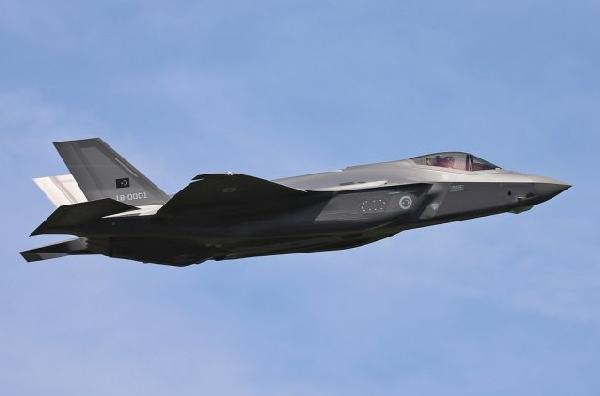
Turkey’s increasingly autocratic president, Recep Tayyip Erdoğan is an erstwhile NATO ally. Turkey flies F-16s and is a partner in the F-35 program. But Erdogan has committed his country to buying Russia’s reportedly excellent surface to air missile system, the S-400. This op-ed by Bradley Bowman, former aide to Sen. Todd Young of the Senate Foreign Relations Committee and to former Sen. Kelly Ayotte of the Senate Armed Services Committee, explores the military aspects of why selling the F-35 to Turkey is a bad idea if Erdogan goes ahead with the S-400 buy. Our accompanying op-ed by Robbin Laird, member of the Breaking D Board of Contributors, delves more deeply into Erdogan’s geo-strategic goals and why they increasingly put him at loggerheads with his allies. Read on! The Editor.
While Turkey is a NATO ally, it has hardly been acting like one. Indeed, one would not expect an ally to purchase an air defense system from Russia, the preeminent military threat to the alliance. Yet, Turkish President Recep Tayyip Erdogan recently reaffirmed plans to purchase the S-400 from Moscow. This raises serious questions about Turkey’s commitment to the NATO alliance and gives Russia an extraordinary opportunity to compromise the F-35, a mainstay of U.S. and allied combat aviation forces going forward.
If Erdogan proceeds with the purchase of the S-400, the U.S. should cancel deliveries of the F-35 to Turkey, and remove Turkish companies from the F-35 production and supply chain.
The co-location of the S-400 and the F-35s in Turkey would provide Moscow a myriad of opportunities to rehearse detecting and shooting down F-35s, undermining the combat effectiveness of an aircraft designed to give the U.S. a vital edge over great power adversaries.
The F-35 is an “all-weather, precision, stealthy, air–to–air, and ground strike capability” fifth-generation fighter. Yet, the F-35 is more than just a weapons platform. Its advanced sensors and capabilities will give the F-35 an outsized importance in future multi-domain operations against U.S. adversaries. A breach of the F-35’s advanced technologies would have consequences both serious and far-reaching.
Acting Assistant Secretary of Defense for International Security Affairs Katie Wheelbarger explained the problem of co-location effectively when she noted, “The S-400 is a computer. The F-35 is a computer. You don’t hook your computer to your adversary’s computer and that’s basically what we would be doing.”

Gen. Tod Wolters, NATO Allied Air Commander and the nominee to serve as head of European Command, has testified, “Anything that an S-400 can do that affords it the ability to better understand a capability like the F-35 is certainly not to the advantage of the coalition.” The co-location of the F-35 and S-400 would present Russia an opportunity to do just that.
One could further expect Russia to share this information with potential adversaries – and clients – such as China, which also operates the S-400.
Gen. Curtis Scaparrotti, the top U.S. military commander in Europe, said Turkey’s acquisition of the S-400, “presents a problem to all of our aircraft, but specifically the F-35.” Based on this, he recommended against selling F-35s to Turkey if Ankara moves forward with its purchase of the S-400. When the American military officer who has spent the last three years focused on the Russian threat makes such a recommendation, policymakers would be wise to listen.
To date, Ankara has ignored Washington’s concerns, rebuffing its offer of a viable alternative in the American-made Patriot air and missile defense system.
Some point to assurances from Ankara that Turkish personnel would be trained by Russians outside of Turkey. Given Erdogan’s track record, such promises should be viewed with healthy skepticism.
Others worry that removing Turkey from the F-35 program might create problems because Turkish companies help produce components of the plane, including elements of its fuselage and cockpit display. Yet Pentagon officials have made clear that these challenges are manageable.
It is worth considering that nothing will hurt the long-term health and competitiveness of the F-35 program more than a perception that the aircraft may not be successful against a great power adversary due to the compromise of key technologies.
There is no doubt that removal of Turkey from the F-35 program will cause additional strain in the bilateral relationship. This fact, however, should be weighed in the context of the broader deterioration in Ankara’s behavior. In recent years, we have seen Turkey cozy up to Vladimir Putin, attack American ground partners in Syria who have been pivotal in the fight against ISIS, and hold Americans hostage, including Pastor Andrew Brunson. Under Erdogan, Turkey has clearly pivoted away from the U.S. and likely will continue to do so regardless of the F-35 decision.
In short, any challenges related to the removal of Turkey from the program pale in comparison to the consequences for American and allied national security associated with the co-location of the S-400 and the F-35.
A November 2018 DoD report detailed “unavoidable negative consequences for U.S.-Turkey relations, as well as Turkey’s role in NATO” if Ankara proceeds with the acquisition of the S-400. In addition to endangering Turkey’s role in the F-35 program, these included the end of other potential arms transfers, reduction in NATO interoperability, and increased Turkish dependence on Russia.
The U.S. may even be compelled to impose sanctions on Ankara for the purchase of Russian arms, which would underscore the dissonance between Turkey’s behavior and the country’s status as a NATO ally.
For the sake of the bilateral relationship, NATO security, and the interests of the American and Turkish people, hopefully Erdogan will change course. If not, Ankara should lose the F-35.
Bradley Bowman is senior director for the Center on Military and Political Power at the Foundation for Defense of Democracies (FDD), where Andrew Gabel is a research analyst. Follow Bradley and Andrew on Twitter at@Brad_L_Bowman and @Andrew_B_Gabel.
Follow FDD on Twitter @FDD and @FDD_CMPP. FDD is a nonpartisan Washington research institute focusing on national security and foreign policy.

